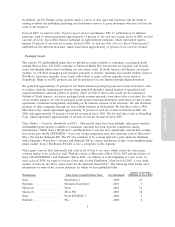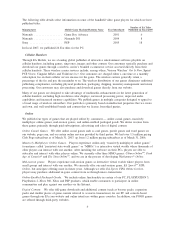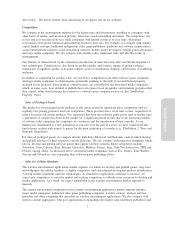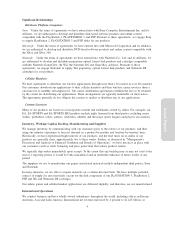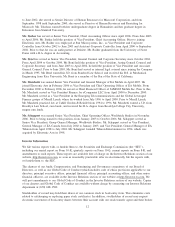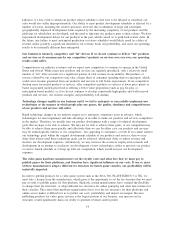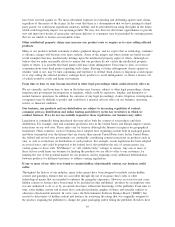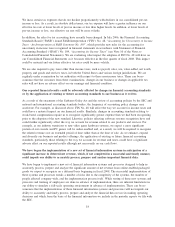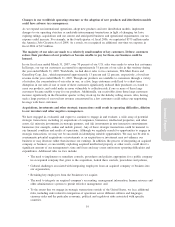Electronic Arts 2007 Annual Report Download - page 89
Download and view the complete annual report
Please find page 89 of the 2007 Electronic Arts annual report below. You can navigate through the pages in the report by either clicking on the pages listed below, or by using the keyword search tool below to find specific information within the annual report.
The video game hardware manufacturers are among our chief competitors and frequently control the
manufacturing of and/or access to our video game products. If they do not approve our products, we
will be unable to ship to our customers.
Our agreements with hardware licensors (such as Sony for the PLAYSTATION 3, Microsoft for the Xbox 360,
and Nintendo for the Wii) typically give significant control to the licensor over the approval and manufacturing
of our products, which could, in certain circumstances, leave us unable to get our products approved,
manufactured and shipped to customers. These hardware licensors are also among our chief competitors.
Generally, control of the approval and manufacturing process by the hardware licensors increases both our
manufacturing lead times and costs as compared to those we can achieve independently. While we believe that
our relationships with our hardware licensors are currently good, the potential for these licensors to delay or
refuse to approve or manufacture our products exists. Such occurrences would harm our business and our
financial performance.
We also require compatibility code and the consent of Microsoft, Sony and Nintendo in order to include online
capabilities in our products for their respective platforms. As online capabilities for video game systems
become more significant, Microsoft, Sony and Nintendo could restrict the manner in which we provide online
capabilities for our products. If Microsoft, Sony or Nintendo refused to approve our products with online
capabilities or significantly impacted the financial terms on which these services are offered to our customers,
our business could be harmed.
If we are unable to maintain or acquire licenses to intellectual property, we will publish fewer hit titles
and our revenue, profitability and cash flows will decline. Competition for these licenses may make them
more expensive and increase our costs.
Many of our products are based on or incorporate intellectual property owned by others. For example, our EA
SPORTS products include rights licensed from major sports leagues and players’ associations. Similarly, many
of our other hit franchises, such as The Godfather, Harry Potter and Lord of the Rings, are based on key film
and literary licenses. Competition for these licenses is intense. If we are unable to maintain these licenses or
obtain additional licenses with significant commercial value, our revenues and profitability will decline
significantly. Competition for these licenses may also drive up the advances, guarantees and royalties that we
must pay to the licensor, which could significantly increase our costs.
Our business is subject to risks generally associated with the entertainment industry, any of which could
significantly harm our operating results.
Our business is subject to risks that are generally associated with the entertainment industry, many of which
are beyond our control. These risks could negatively impact our operating results and include: the popularity,
price and timing of our games and the platforms on which they are played; economic conditions that adversely
affect discretionary consumer spending; changes in consumer demographics; the availability and popularity of
other forms of entertainment; and critical reviews and public tastes and preferences, which may change rapidly
and cannot necessarily be predicted.
If we do not continue to attract and retain key personnel, we will be unable to effectively conduct our
business.
The market for technical, creative, marketing and other personnel essential to the development and marketing
of our products and management of our businesses is extremely competitive. Our leading position within the
interactive entertainment industry makes us a prime target for recruiting of executives and key creative talent.
If we cannot successfully recruit and retain the employees we need, or replace key employees following their
departure, our ability to develop and manage our businesses will be impaired.
If patent claims continue to be asserted against us, we may be unable to sustain our current business
models or profits, or we may be precluded from pursuing new business opportunities in the future.
Many patents have been issued that may apply to widely-used game technologies, or to potential new modes
of delivering, playing or monetizing game software products. For example, infringement claims under many
issued patents are now being asserted against interactive software or online game sites. Several such claims
Annual Report
15


